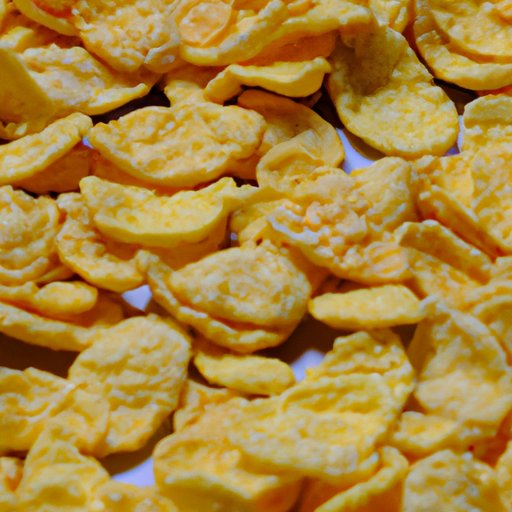
I. Introduction
A gluten-free diet is essential for those with celiac disease and non-celiac gluten sensitivity. But the question remains: can corn flakes be considered gluten-free? In this article, we will explore the safety of corn flakes for those with gluten sensitivities, compare corn flakes to other gluten-free cereal alternatives, learn about the nutritional value, and find out how corn flakes are manufactured. We will also provide some delicious recipes for incorporating corn flakes into your gluten-free diet.
II. Corn Flakes: A Gluten-Free Breakfast Option?
Before diving into whether corn flakes are gluten-free, it is essential to define what gluten-free means. Gluten is a protein found in wheat, barley, rye, and other grains. A gluten-free diet is free of these grains and any products containing them.
One of the major concerns with corn flakes is cross-contamination. This occurs when food products come into contact with gluten-containing grains during the manufacturing process. Some corn flakes may be processed in facilities that also process gluten-containing grains, which can lead to cross-contamination.
Another issue is that there are varying opinions on whether corn flakes are 100% gluten-free. Some manufacturers create their corn flakes without adding gluten-containing ingredients, while others may add barley malt flavoring or other additives that contain gluten. It is essential to read the ingredients list and check for any gluten-containing ingredients before consuming corn flakes.
If you have gluten sensitivities and want to ensure that your corn flakes are safe, look for brands that are certified gluten-free by organizations such as the Gluten-Free Certification Organization (GFCO) or the Celiac Support Association (CSA).
III. Exploring Gluten-Free Cereal Alternatives: A Review of Corn Flakes
Corn flakes are a popular breakfast cereal option and are prevalent in most households. Compared to other gluten-free cereal alternatives, corn flakes often have a mild taste, making them an ideal cereal option for those who prefer a less sweet breakfast. Corn flakes are available in various flavors such as honey, chocolate, and regular, among others.
When it comes to the nutritional value of corn flakes, they are low in calories and fat and high in vitamins and minerals. One cup of corn flakes with half a cup of skim milk provides 150 calories, 1 gram of fat, 1 gram of fiber, and 8 grams of protein. While corn flakes may not be the most nutritious breakfast option, they are an excellent alternative to gluten-containing cereals.
Corn flakes have some advantages over other gluten-free cereal options. They are easily available in most grocery stores and are incredibly affordable. Cornflakes are versatile and can be used in various recipes such as crispy chicken, granola, and sweet treats like marshmallow bars.
IV. The Benefits and Drawbacks of Incorporating Corn Flakes into a Gluten-Free Diet
There are pros and cons to including corn flakes in a gluten-free diet. One of the main advantages is the potential health benefits. Corn flakes are an excellent source of vitamins and minerals and provide a quick and easy breakfast option for busy mornings.
However, there are common pitfalls for gluten-free eaters when consuming corn flakes. As mentioned earlier, cross-contamination is a significant concern, and some brands may contain gluten. Additionally, some corn flakes may contain excess sugar and salt, which can be harmful to your health.
V. The Science Behind Gluten-Free Corn Flakes: How Do They Work?
The chemical makeup of corn flakes is simple. Corn flakes are made from corn, sugar, malt flavoring, and salt. Corn flakes are processed by cooking and flaking corn, which is then toasted until crispy. To make gluten-free corn flakes, manufacturers will use alternative grain sources such as rice or corn to avoid cross-contamination.
The process of creating gluten-free corn flakes involves making sure that there is no contact with gluten-containing grains during production. Manufacturers must ensure that their equipment is entirely free of gluten by thoroughly cleaning and sanitizing their facilities between production runs.
For those with celiac disease or non-celiac gluten sensitivity, it is essential to stick to the gluten-free brands, which have been certified gluten-free by reputable organizations. Certification ensures that the corn flakes have been manufactured using equipment that is entirely free of gluten, and no cross-contamination has occurred.
VI. Cooking with Corn Flakes: Delicious Gluten-Free Recipes for the Whole Family
Corn flakes are a versatile and delicious ingredient that can be used in many different recipes. Here are some recipe ideas to incorporate corn flakes into your gluten-free diet:
A. Breakfast Options
- Corn flakes with almond milk and fruit
- Corn flakes mixed with yogurt and berries
- Corn flakes granola with honey and nuts
B. Snack Ideas
- Corn flakes cereal bars with peanut butter and honey
- Corn flakes trail mix with dried fruit and nuts
- Corn flakes and chocolate-covered strawberries
C. Dinner Recipes
- Cornflake-crusted chicken tenders
- Cornflake-coated fish tacos
- Cornflake-coated pork chops
D. All featuring corn flakes as a key ingredient
VII. Conclusion
Corn flakes can be a delicious and healthy gluten-free breakfast option. Ensure that you buy certified gluten-free cornflakes to avoid cross-contamination, and be aware of the added sugar and salt content. Overall, using corn flakes as a key ingredient in your gluten-free diet can add variety and flavor to your meals.





